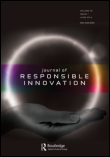
Access provided by University of North Texas

Knowledge kills action – why principles should play a limited role in policy-making
- DOI:
- 10.1080/23299460.2014.882554
pages 51-66
- Received: 8 Nov 2013
- Accepted: 7 Jan 2014
- Accepted author version posted online: 28 Jan 2014
Published online: 06 Mar 2014
Abstract
This essay argues that principles should play a limited role in policy-making. It first illustrates the dilemma of timely action in the face of uncertain unintended consequences. It then introduces the precautionary and proactionary principles as different alignments of knowledge and action within the policy-making process. The essay next considers a cynical and a hopeful reading of the role of these principles in public policy debates. We argue that the two principles, despite initial appearances, are not all that different when it comes to formulating public policy. We also suggest that allowing principles to determine our actions undermines the sense of autonomy necessary for true action.
Keywords
- precautionary principle,
- proactionary principle,
- policy,
- decision procedure,
- risk,
- uncertainty,
- autonomy
Related articles
View all related articlesFirst page preview
Details
- Received: 8 Nov 2013
- Accepted: 7 Jan 2014
- Accepted author version posted online: 28 Jan 2014
- Published online: 06 Mar 2014
Author affiliations
- a School of Public Policy, Georgia Institute of Technology, Atlanta, GA, USA
- b Department of Philosophy and Religion Studies, University of North Texas, Denton, TX, USA
- c Center for the Study of Interdisciplinarity, University of North Texas, Denton, TX, USA
Librarians
- Librarians' area
- Pricing
- Institutional account
- Access entitlements
- Co-branding
- IP ranges
- Link resolver preferences
- Usage reports

